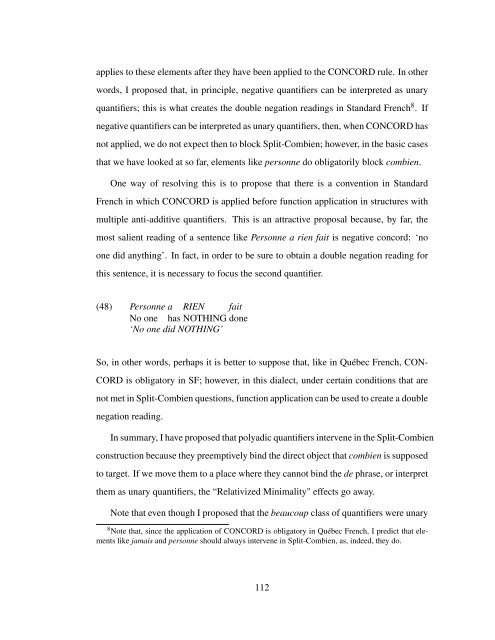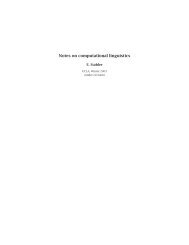Formal Approaches to Semantic Microvariation: Adverbial ...
Formal Approaches to Semantic Microvariation: Adverbial ...
Formal Approaches to Semantic Microvariation: Adverbial ...
You also want an ePaper? Increase the reach of your titles
YUMPU automatically turns print PDFs into web optimized ePapers that Google loves.
applies <strong>to</strong> these elements after they have been applied <strong>to</strong> the CONCORD rule. In other<br />
words, I proposed that, in principle, negative quantifiers can be interpreted as unary<br />
quantifiers; this is what creates the double negation readings in Standard French 8 . If<br />
negative quantifiers can be interpreted as unary quantifiers, then, when CONCORD has<br />
not applied, we do not expect then <strong>to</strong> block Split-Combien; however, in the basic cases<br />
that we have looked at so far, elements like personne do obliga<strong>to</strong>rily block combien.<br />
One way of resolving this is <strong>to</strong> propose that there is a convention in Standard<br />
French in which CONCORD is applied before function application in structures with<br />
multiple anti-additive quantifiers. This is an attractive proposal because, by far, the<br />
most salient reading of a sentence like Personne a rien fait is negative concord: ‘no<br />
one did anything’. In fact, in order <strong>to</strong> be sure <strong>to</strong> obtain a double negation reading for<br />
this sentence, it is necessary <strong>to</strong> focus the second quantifier.<br />
(48) Personne a RIEN fait<br />
No one has NOTHING done<br />
‘No one did NOTHING’<br />
So, in other words, perhaps it is better <strong>to</strong> suppose that, like in Québec French, CON-<br />
CORD is obliga<strong>to</strong>ry in SF; however, in this dialect, under certain conditions that are<br />
not met in Split-Combien questions, function application can be used <strong>to</strong> create a double<br />
negation reading.<br />
In summary, I have proposed that polyadic quantifiers intervene in the Split-Combien<br />
construction because they preemptively bind the direct object that combien is supposed<br />
<strong>to</strong> target. If we move them <strong>to</strong> a place where they cannot bind the de phrase, or interpret<br />
them as unary quantifiers, the “Relativized Minimality" effects go away.<br />
Note that even though I proposed that the beaucoup class of quantifiers were unary<br />
8 Note that, since the application of CONCORD is obliga<strong>to</strong>ry in Québec French, I predict that elements<br />
like jamais and personne should always intervene in Split-Combien, as, indeed, they do.<br />
112
















